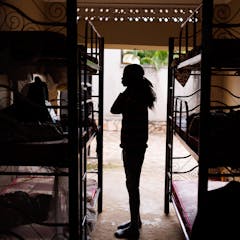
Articles on Stigma
Displaying 1 - 20 of 135 articles

The ‘skivers against strivers’ view of welfare keeps people in poverty feeling ashamed and isolated.

A recent study found only around half of people disclosed or felt they should disclose an STI to a partner before having sex.

People with long COVID have already fought hard to become visible.

Historically, many Christians got tattoos around Holy Week − usually a cross − to honor Christ’s martyrdom.

In addition to asking health-care systems to prepare to end suffering of mental illness through Medical Assistance in Dying (MAID), we must ask policymakers to support better lives for families.

Negative attitudes lead to stigma, which sees people who use drugs isolated and marginalised.

Calls to destigmatize language around drug addiction must be combined with action to change policies that stigmatize people in early recovery.

One in six people diagnosed late with alcohol use disorder die on their first admission to hospital.

Owen Farrell is part of a growing number of athletes speaking out about their wellbeing.

Endometriosis often means years of severe pain, lost productivity and dismissed symptoms before getting a diagnosis — followed by ineffective treatment. New funding aims to change this pattern.

In rural Ghana, only 18% of patients believe elephantiasis is a disease. Some others think it is caused by curses or even rain. Only by understanding local beliefs can it be treated effectively.

Tyson Fury has a history of mental ill health, something which is reflected in his series, At Home With The Furys on Netflix.

Stigmatised people living with HIV often suffer from fear, depression and abuse. It’s sometimes easier to stop a treatment regime than risk being ostracised or assaulted by the community.

Whistleblowers should be entitled to financial support. But that has potential costs as well as benefits.

When people living with HIV in Nigeria receive support from close friends, they are less likely to experience stigma and associated poor health outcomes.

Discrimination, isolation and stigma related to sexual orientation or gender identity likely contribute to the higher rates of depression and lower quality of life of LGBTQ+ caregivers.

Stigma and shame around menstruation can be found as far back as the Bible.

Obesity is out and ‘adipose-based chronic disease’ is in, according to a recent paper. But a name change alone won’t fix entrenched stigma.

Australian of the year Taryn Brumfitt has called for doctors to avoid raising the issue of weight in consultations about other matters. We asked the experts if they should – or not.

The success of anti-smoking campaigns has come with growing stigma around lung cancer. Over one quarter of Australians admit they have less sympathy for lung cancer sufferers.
